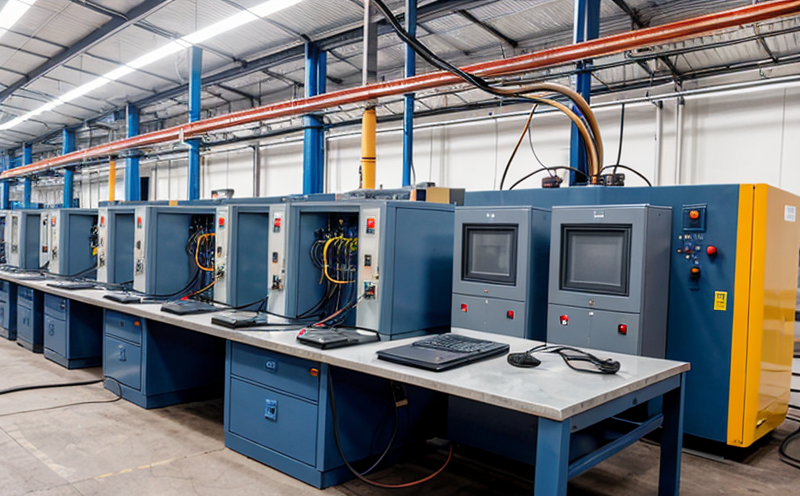IEC 62040 Uninterruptible Power Supply UPS Testing
The International Electrotechnical Commission (IEC) Standard IEC 62040 provides guidelines for the performance testing of Uninterruptible Power Supplies (UPS). This standard is crucial in ensuring that UPS systems meet the high reliability and efficiency expectations set by modern industrial applications. Industrial manufacturing and processing plants often depend on uninterruptible power supplies to maintain critical operations during power outages or fluctuations.
IEC 62040 specifies testing procedures for various aspects of UPS functionality, including voltage regulation, frequency stability, transient response time, and load handling capacity. These tests are essential in validating that the UPS can seamlessly transfer from utility power to battery backup without any loss of data integrity or system downtime.
Testing according to IEC 62040 helps ensure compliance with international standards, which is critical for industries such as automotive manufacturing, semiconductor processing, and pharmaceutical production. These sectors require uninterrupted power supply systems that can meet stringent reliability requirements to prevent costly disruptions in production processes.
The testing process involves several key steps. Initially, the UPS must be connected to a load simulating the actual operating conditions it will face during use. The test setup includes voltage and frequency sources capable of replicating typical industrial power fluctuations. Once the system is configured, continuous monitoring begins, recording various parameters such as input voltage and current, output voltage and current, and battery discharge rates.
The testing protocol also involves evaluating the UPS's ability to handle different types of loads, including resistive, inductive, and capacitive loads. This evaluation ensures that the UPS can efficiently manage power demands across various industrial applications. Additionally, transient response tests assess how quickly the UPS switches from utility power to battery backup during a power failure.
After completing these tests, detailed reports are generated documenting all test parameters and results. These reports serve as critical evidence of the UPS's performance capabilities and reliability. Compliance with IEC 62040 not only enhances operational efficiency but also supports regulatory compliance, which is essential for businesses operating in international markets.
The scope of IEC 62040 testing includes both stand-alone UPS systems and those integrated into larger power distribution networks. By adhering to this standard, manufacturers and installers can ensure that their products meet the highest global standards for reliability and efficiency.
Scope and Methodology
The scope of IEC 62040 UPS testing includes a comprehensive evaluation of the UPS's performance under various operating conditions. The methodology involves multiple stages to ensure thorough assessment:
Initial configuration and setup of the UPS with appropriate load simulations.
Continuous monitoring of key parameters during steady-state operation.
Evaluation of transient response during power failures.
Testing under different types of loads to assess versatility and efficiency.
The testing process is designed to simulate real-world conditions, ensuring that the UPS performs reliably in industrial environments. Compliance with IEC 62040 not only enhances operational reliability but also supports regulatory compliance for international markets.
Benefits
Ensures high reliability and efficiency of uninterruptible power supplies used in critical applications.
Meets stringent industry standards, enhancing reputation and marketability.
Supports regulatory compliance for businesses operating internationally.
Reduces downtime and operational disruptions by ensuring consistent power supply.
The benefits of adhering to IEC 62040 extend beyond mere compliance; they contribute significantly to the overall efficiency and reliability of industrial operations. By investing in UPS testing according to this standard, organizations can achieve long-term cost savings through reduced maintenance and operational risks.
Use Cases and Application Examples
| Industry Sector | UPS System Testing Requirements |
|---|---|
Automotive Manufacturing |
Testing for uninterrupted power supply during critical assembly processes. |
Semiconductor Processing |
Evaluating UPS performance in cleanroom environments to ensure process integrity. |
Pharmaceutical Production |
Assuring continuous power supply for temperature-sensitive operations and laboratory equipment. |
Telecommunications Infrastructure |
Ensuring reliable backup power during network outages to prevent service disruptions. |
The table above highlights various industries where IEC 62040 UPS testing plays a crucial role. In each case, the UPS must perform reliably under demanding conditions to ensure uninterrupted and efficient operations. This ensures that critical processes are not compromised by power outages or fluctuations.
Automotive manufacturing plants rely on UPS systems to maintain assembly line continuity during unexpected power interruptions.
Semiconductor processing facilities require stable power to protect sensitive equipment from voltage spikes and dips, ensuring product quality.
Pharmaceutical companies depend on UPS systems for temperature-controlled environments and laboratory equipment that must operate continuously without interruption.
Telecommunications providers utilize UPS systems to maintain network availability during outages, safeguarding customer data and services.
In these sectors, the reliability of UPS systems is paramount. By adhering to IEC 62040 testing protocols, organizations can ensure that their power supplies meet the highest standards for performance and safety.





